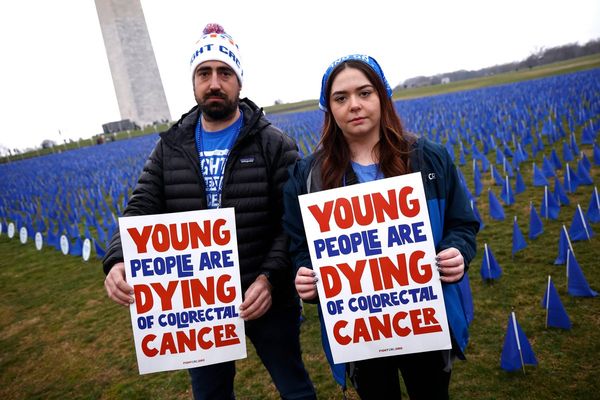
The US government is on the brink of a shutdown after the Senate on Tuesday rejected competing plans to extend funding beyond midnight.
Senate Democrats blocked legislation put forward by the Republican majority to fund the government through 21 November, while Republicans united to stop a separate Democratic-backed measure that would have extended healthcare benefits and other priorities. Both proposals failed to clear the 60-vote threshold for advancement in the chamber.
“Far-left interest groups and far-left Democrat members wanted to show down with the president, and so Senate Democrats have sacrificed the American people to Democrats’ partisan interests,” Senate majority leader John Thune said after the vote.
The Senate’s top Democrat, Chuck Schumer, accused the GOP of refusing to negotiate with them on his party’s demands, which center on an extension of tax credits for Affordable Care Act (ACA) plans and a reversal of cuts to the Medicaid health insurance program for poor and disabled Americans.
“Republicans are plunging America into a shutdown, rejecting bipartisan talks, pushing a partisan bill and risking America’s healthcare,” he said.
The White House has threatened to fire federal workers en masse if the government shuts down. “When you shut it down, you have to do layoffs, so we’d be laying off a lot of people,” Donald Trump said earlier in the day, adding: “They’re going to be Democrats.”
Shortly after the failed votes, the White House office of management and budget released a letter blaming “Democrats’ insane policy demands” for a shutdown it characterized as inevitable. “It is unclear how long Democrats will maintain their untenable posture, making the duration of the shutdown difficult to predict,” read the letter, which was addressed to the heads of federal offices and agencies.
While the Senate rejected the Democratic bill on a party-line vote, three members of the Democratic caucus voted for the Republican proposal – two more than when the bill was first considered earlier this month. Senate Republican leaders said they would again vote on the funding bills on Wednesday, in a bid to pressure Democrats to change their votes.
“The cracks in the Democrats are already showing,” Senate Republican whip John Barrasso said.
Democrats who broke with their party indicated they did so out of concern for what the Trump administration might do when the government shuts down. Federal law gives agencies and departments some leeway in determining which operations continue when funding lapses.
“I cannot support a costly shutdown that would hurt Nevada families and hand even more power to this reckless administration,” said Democratic senator Catherine Cortez Masto.
Angus King, a Maine independent who caucuses with the Democrats, called the vote “one of the most difficult” of his Senate career, but said: “The paradox is by shutting the government we’re actually giving Donald Trump more power, and that was why I voted yes.”
Pennsylvania’s John Fetterman, the sole Democrat to vote for the Republican funding bill when it was first considered a week and a half ago, supported it once again, saying: “My vote was for our country over my party. Together, we must find a better way forward.”
The spending deadlock persisted even after Trump agreed to a meeting with congressional Democratic leaders at the White House on Monday that was seen as the last best chance to ward off a shutdown. It led to no breakthrough.
Hours after it concluded, the president posted on social media an AI-generated video showing the top House Democrat, Hakeem Jeffries wearing a sombrero and mustache and standing alongside Schumer, saying:“Not even Black people want to vote for us anymore. Even Latinos hate us.”
Jeffries, who had met Trump for the first time on Monday, said at the Capitol the following day: “The next time you have something to say about me, don’t cop out through a racist and fake AI video. When I’m back in the Oval Office, say it to my face.”
The Republican-controlled House of Representatives passed their funding bill on a near party-line vote earlier this month, but Democrats vowed not to give it the support it needs to pass the Senate without concessions.
The minority party is demanding an extension of premium tax credits for ACA plans, which expire at the end of the year. They also want to undo Republican cuts to Medicaid and public media outlets, while preventing Trump’s use of a “pocket rescission” to further gut foreign aid.
The total cost of those provisions is expected to hit $1tn, while about 10 million people are expected to lose healthcare due to the Medicaid cuts, as well as to changes to the ACA. Without an extension of the tax credits for premiums, health insurance prices will rise for around 20 million people.
While Thune has said he would be willing to negotiate over extending the ACA credits, he insists government funding be approved first.
Any changes to the Republican spending bill negotiated in the Senate would have to be approved by the House, but the speaker, Mike Johnson, has kept the chamber in recess for the past week and a half, in a bid to pressure Democrats into swallowing the bill as is. When the House held a brief procedural session at noon on Tuesday, Democrats filled the chamber in a failed effort to force consideration of their funding bill.
While the party that instigates a shutdown has historically failed to achieve their goals, polls have given mixed verdicts on how the public views the Democrats’ tactics.
A New York Times/Siena poll taken last week found that only 27% of respondents said the Democrats should shut down the government, while 65% thought they should not. Among Democrats, the split was 47% in favor of a shutdown and 43% against, while 59% of independents were opposed to a shutdown.
A Marist poll released on Tuesday found that 38% of voters would blame congressional Republicans for a shutdown, while 27% would blame the Democrats, and 31% would point a finger at both parties equally.
Republican senator Ted Cruz – an architect of a 2013 shutdown intended to defund the ACA – described Democrats’s shutdown threat as a “temper tantrum” that would go nowhere.
“They’re trying to show … that they hate Trump,” Cruz told reporters. “It will end inevitably in capitulation. At some point they’re going to turn the lights on again, but first they have to rage into the night.”







